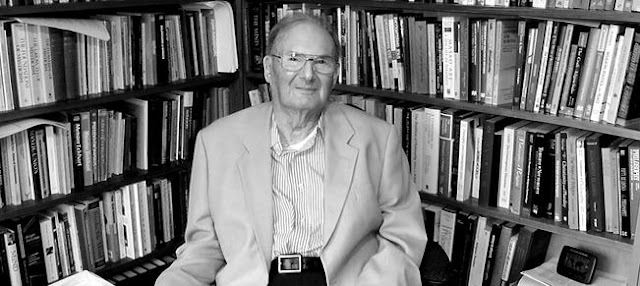CARL F. HENRY’s NOTE ON JESUS OF NAZARETH
Carl F. Henry is a professor and also a Lecturer at Large at Prison Fellowship Ministries. He had a lot to say but here is an excerpt from his teachings.
“Nowhere is the tension between historically repeatable acts and a once-for-all event focused more dramatically than in the conflict over the identity of Jesus of Nazareth. Shall we explain him as the ideal model of mankind and expound divine incarnation by philosophical analysis of what is humanly possible, or shall we depict him rather in terms of the christologically unparalleled?
The Gospels provide our only significant information about Jesus' life and work. Skeptical critics thrust upon these sources tests of reliabil- ity that they do not impose upon other historical writing. If universally applied, those same criteria would in principle invalidate ancient Greek and Roman accounts that secular historians routinely accept as factual.
Efforts to destroy the credibility of gospels often betray a bias against the supernatural. Gerald G. O'Collins recalls "the official Soviet thesis (which appears recently to have been abandoned) that Jesus never existed and was a purely mythological figure.”2 Consistent Marx- ists would need to reject the theology-of-revolution view that the his- torical figure of Jesus nurtures its liberationist challenge to an alienated world. The assumptions of evolutionary naturalism likewise lead to a rejection of Jesus as in any way normative and decisive for human destiny.

In striking contrast, some recent modern Jewish leaders unhesi- tatingly applaud the man Jesus. Even the Jewish rebel Spinoza, while disavowing the divinity of Christ, nonetheless considered Jesus the greatest and noblest of all prophets (Epistle 21). C. G. Montefiore (1858-1925) and Joseph Klausner (1874-1960) paid him notable tribute. Montefiore significantly commends Jesus over the whole talmudic in- heritance: "We certainly do not get in the Hebrew Bible any teacher speaking of God as 'Father,' 'my Father,' 'your Father,' and 'our Fa-
ther' like the Jesus of Matthew," he writes. "We do not get so habitual and concentrated a use from any Rabbi in the Talmud."7 Many writ-
ers not victimized by a skeptical view of history now readily concede that Jesus towers above the stream of mankind as an individual of
rare spiritual sensitivity, devotion, and compassion.
In the book The Jewish Reclamation of Jesus8 Donald A Hagner acknowledges that most contemporary Jewish scholarship and Jewish- Christian dialogue still reflects long-standing differences from the evangelical view of Jesus. But he considers "remarkable and significant" the current extensive Jewish research and the evidence it gives of "a drastic change in the Jewish appreciation of Jesus."9 To be sure, the Jewish theological stance remains hostile to the Christian doctrines of incarnation, atonement, and the Trinity, and it refuses to connect Jesus with any significant transformation of the world-order and any new
and decisive historical inbreaking of the Kingdom of God. Yet careful reading of the Gospels increasingly overcomes the ready complaint that Christianity is anti-Semitic, and it more and more elicits a sporadic ac- knowledgement of their claims to historical trustworthiness, as does Pinchas Lapide's admission of the resurrection of Jesus. Alongside this may be noted the clusters of secret believers in the state of Israel, and the remarkable conversion to Christ of many Jews in other lands. It is safe to say that tens of thousands of modern Jews affirm that Jesus fulfills the Old Testament prophecies and is "the Christ, the Son of the living God."
Ironically, as David Novak observes, some Jewish thinkers have judged Islam more favorably than Christianity because of Islam's sup- posedly stricter monotheism and absolute prohibition of images, in contrast with Christian trinitarianism and the use of images in worship by some major branches of Christianity.
However, Jews took a more positive view, one that judged Chris- tianity not idolatrous and which acknowledged trinitarianism to be
not necessarily as a commitment to a different God than Yahweh.
But did Jesus of Nazareth then by his own faith inspire the belief of others in his messianic sonship and divinity? Does Christian faith
in Jesus Christ rest finally upon the impression of Jesus' personality and on claims he made for himself? He indicated the value and limits of the Baptist's testimony without nullifying the importance of his
own messianic consciousness: "I receive not testimony from man; . . . I know that the witness he witnesseth of me is true" (John 5:34, 32).
Yet Jesus warned against claims made independently by himself or anyone else. "If I bear witness of myself, my witness is not true" (John 5:31). He set his own witness in the larger context of that of the Father, of Scripture, and of his own works (John 5:32-39).
Yet for Paul and the Gentile churches it is not Jesus' public min- istry but especially his resurrection from the dead that is the histori- cally decisive point for the Christian community. The Easter faith
was, to be sure, indispensably linked to the incarnation, earthly life and ministry of Jesus. New Testament theology nowhere justifies Bultmann's dismissal of the supernatural Jesus of history in the inter- est solely of an inner "resurrection"-encounter. Indeed, the Gospels leave no doubt that Jesus' own intimations of his impending crucifix- ion and resurrection seemed confusing to the disciples, and that they were both dismayed by his death and unexpectant of his resurrection. It was not their unexpected confrontation by the risen Jesus alone, but the Old Testament prophetic teaching also concerning the coming One that finally illumined Messiah's death and triumph over it in
terms of divine prophecy and fulfillment.
This material is cited with gracious permission from: The Criswell College;
4010 Gaston Ave. Dallas, TX 75246





Comments
Post a Comment